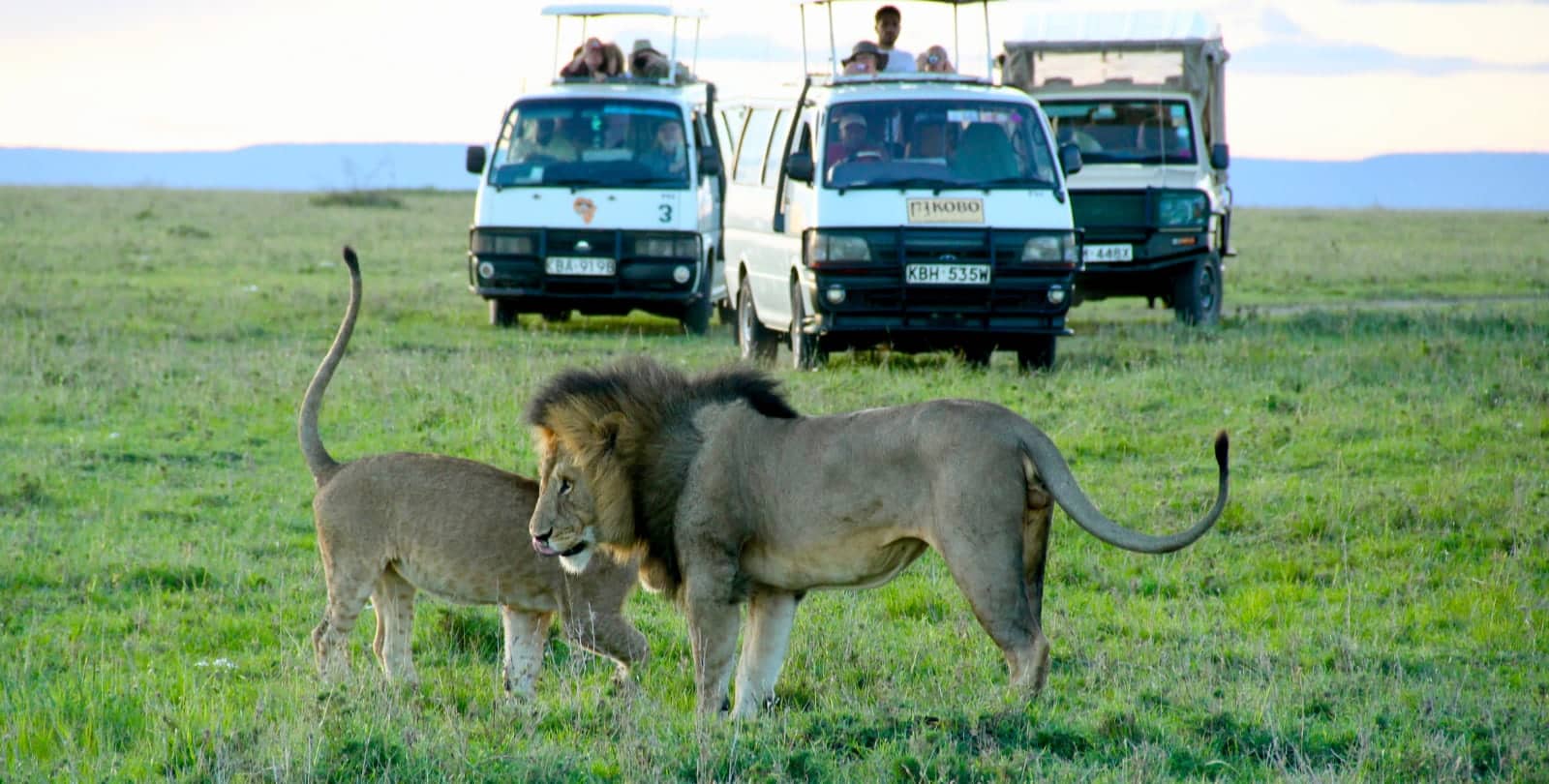
Two lions on the Africa savanna Photo credit: Gerry Feehan
A Better World (Too?)
Africa is a continent of enormous contrast, geographically, politically and economically. While there are some rich, a middle class seems non-existent. But the poor are everywhere; the great majority survive on wages of about $100 a month.
Ironically, tourist amenities are frighteningly expensive. Hotels are often $300 a night. Park fees are $60 per person per day. As one of our group put it, “In Africa it’s either Five Star or No Star.” A load of (urgently needed) laundry cost us almost fifty bucks.
A one hour balloon-ride over the savannah was $425. Someone in Africa is pocketing big margin!
Muhamed, our Kenyan driver, told me that Kenya’s biggest problems are tribalism and corruption. Tribalism explains why long-standing leaders wear out their welcome long before giving up power: a new regime could mean transferring favouritism to another tribe.
Corruption is also systemic. Most Kenyans get around by matatu: small vans seating fourteen – in a vehicle we Canadians wouldn’t think fit to seat six. When police flag down a matatu there are often eighteen or more people on board. That’s okay. The policeman fines the driver half the extra fare and pockets the cash. But the honest matatu driver is in trouble. If he carries the legal limit he can’t be fined for crowding so the policeman will inspect lights, tires, wipers, etc. and extract money in this fashion. Most matatus we saw were jammed to exploding.
We left the Kenyan Highlands and drove south to the famous Masai Mara National Reserve, part of the huge Serengeti plain which extends into Tanzania. Our quest was to observe the “Big Five”.
We had seen rhinos and cape buffalo at Nakuru so the group was giddy when on our first sunrise trip into the Masai Mara we were treated to the final three: the huge bulk of a bull elephant crossing our muddy path, a leopard feasting in a tree and a male’s mane nuzzling a lioness. We watched jaws agape from the safety of our safari van.
Back at the lodge I immediately headed for the gift shop to acquire an overpriced “I Saw The Big Five” T-shirt to flaunt in front of my envious friends freezing back in Canada.
On his first visit to the Masai Mara in 1999 Eric Rajah noticed a young man teaching a group of children under a tree near the village of Telek just outside the park gate. The shade of an umbrella acacia was Jacob’s classroom. Today thanks to A Better World the school has real walls, running water and four hundred students.
But cultural and economic issues haunt the Masai. The gruesome practice of adult circumcision is still prevalent – for both men and women.
Jacob is married and a father now. His monthly teacher’s salary is 70,000 Kenyan Shillings – about $80. He pays a herder 40,000 shillings to tend his 10 cows and 20 goats. With what’s left Jacob must feed his young family plus five siblings – Jacob’s mother died recently leaving them in his care.
Traditionally Masai survive on a diet of meat, blood and milk, all supplied by the cow. When I asked, “Why not sell the animals rather than spend half your salary having them tended?” Jacob, an educated man, answered simply, “Without cows a Masai man is nothing.”
Some Kenyan beliefs, while scientifically debatable are nevertheless laudable. Few Kenyans smoke. They believe tobacco makes a man impotent. Perhaps Health Canada should capture this image on cigarette packages?
Africa is not for everyone. If you like ice with your drinks you may want to give the Dark Continent a pass. If like me you react poorly to anti-malarial medication – and wind up enduring psychotic nightmares – Africa may not be your cup of chai. But if you are seeking an extraordinary experience, remarkable wildlife viewing coupled with the unique cultural opportunity afforded by helping at the grass-roots level, A Better World is where it’s at.
On our last African night together, soaking in the sultry heat of Mombasa on Kenya’s Indian Ocean coast, Eric summarized, “Our group is voluntary, imperfect and collective.”
A Better World is not going to save the planet or solve its myriad problems. But as Eric Rajah, whom I affectionately refer to as the humanitarian schmoozer, says, “We can throw up our hands or we can raise them up”.
I wouldn’t say that my time in Africa has made this a better world. But I am confident that the efforts of my fellow travellers has. And I am humbled by their example.
Gerry
